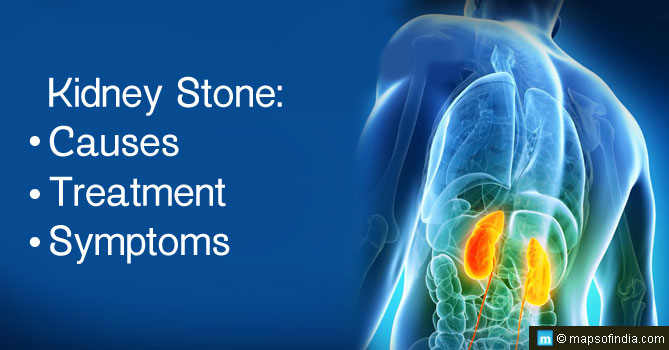Kidney stones are medically known as nephrolithiasis or renal lithiasis. When the crystal-forming substances (including calcium, oxalate and uric acid) start getting deposited in your kidneys in the absence of adequate fluid in your urine, kidney stones begin to form. As kidneys help in the removal of waste and fluid from the body by filtering out toxins, excess salt and urea, imbalance between the waste particles and fluid can cause kidney stones. Nowadays, kidney stones have become common because of the sedentary lifestyle of the modern world.
Kidney stones can be extremely painful when they move around in the kidney, or pass through the ureter. They do not cause permanent damage, provided they are detected, recognized, and treated on time. You need surgery only when these hard crystals get lodged in the urinary tract.
Causes of Kidney Stones
Kidney stones are of different types, depending on the crystal-forming substances (Calcium, struvite, uric acid, and cystine stones) from which they are formed. There is no single cause for the formation of kidney stones. Multiple factors increase the risk of stone formation.
- Causes of Calcium Kidney Stones
These stones are formed from deposition and accumulation of calcium oxalate. Their concentration in the urine increases due to unregulated dietary factors, high vitamin D doses, intestinal bypass surgery, or metabolic disorders. Calcium stones can also form as calcium phosphate, a condition caused from metabolic conditions including renal tubular acidosis. Certain seizure medications like topiramate (Topamax) can also cause calcium kidney stones.
- Causes of Struvite Kidney Stones
These types of stones are formed in response to an infection (say, urinary tract infection). They grow quickly and generally do not come with any symptom or warning.
- Causes of Uric Acid Kidney Stones
This kind of stone is generally found in persons who:
– Drink significantly less water
– Eat high-protein food
– Suffer from gout disease
– Suffer from certain genetic disorders
- Causes of Cystine Kidney Stones
Cystine Kidney Stones affect persons having hereditary disorders, leading to excessive excretion of certain types of amino acids (such as cystinuria) from kidney.
Some of the risk factors that increase the chances of kidney stone formation include personal/family history of stone formation, dehydration, intake of protein/ salt/ sugar-rich diet, obesity, digestive problems, and other medical issues (such as renal tubular acidosis, hyperparathyroidism, cystinuria, urinary tract infections, and others).
Symptoms of Kidney Stones
Kidney stones can’t be detected by the patient until and unless they move around within the kidney or pass into and get lodged in the ureter (the tube that connects the kidney and bladder), causing pain.
Here are some of the symptoms of kidney stones:
- Pain at the time of urination
- Pain coming in waves and fluctuating in intensity
- Unusual urine color (pink/ red/ brown)
- Pain radiating to the lower abdomen and groin
- Pain felt below the ribs, side, and back
- Urine is cloudy and foul smelling
- Nausea
- Vomiting
- Urge to urinate more (than usual)
- Urinate more frequently than usual
- Small amounts of urination
- Fevers and chills (in case of renal infection)
Treatment of Kidney Stones
The treatment of kidney stone depends upon the size of the stone. You must visit a doctor if you find any of the above mentioned symptoms. You may be advised to carry out certain medical tests including x-ray, blood test, urine test, or CT scan. If the outcome is positive, the doctor may advise you the following types of treatment:
- In case of small kidney stone, doctor may advise the patient to drink lots of water and also take pain relief medicine.
- In case of large kidney stone or blockage of urinary tract, other treatment options may be advised such as:
– Shock Wave Lithotripsy
– Ureteroscopy
– Percutaneous Nephrolithotomy
Conclusion
Prevention is always better than cure. So, to avoid the formation of kidney stones, always try to drink as much fluid/water as possible. An average adult person should take 8-12 glasses of water every day. In addition, try to limit the intake of sodium and animal protein in your diet. And immediately visit a doctor for consultation in case you detect any of the above symptoms.






